For three years, the organizers of Yom Kippur street prayers at Tel Aviv’s Dizengoff Square characterized the services as a moment in which both secular and religious people could unite around Judaism’s holiest day.
This year saw that thesis shattered, however, as the recent tradition — which started in 2020 as the coronavirus pandemic moved prayers outdoors — descended into a shouting and shoving match over organizers’ insistence on placing a divider between the sexes, as required by Jewish Orthodox law, and a refusal by the municipality and secularist protesters to accommodate what they saw as gender-based discrimination in any way on public ground.
The scenes were unprecedented and are already being seen as a watershed moment in the fraught relationship between secularists and religious Jews in Israel, redrawing the borders of acceptable behavior on both sides of the divide.
The intense controversy over the disrupted prayers led far-right National Security Minister Itamar Ben Gvir to announce Tuesday his plans for a sex-segregated prayer event at Dizengoff Square on Thursday to protest what happened on Yom Kippur. But Ben Gvir canceled the event following pressure from right-wing colleagues who feared its combustible potential. Several liberal groups had said they would hold their own, non-segregated prayer at the square simultaneously with Ben Gvir’s planned event, but later moved to Habimah Square, averting the risk of another conflagration on Dizengoff Square.
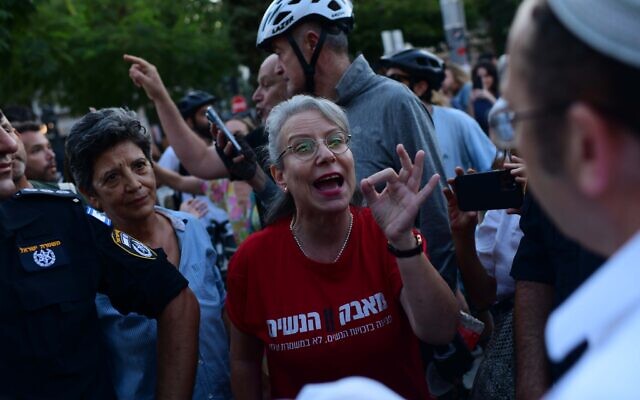
A woman argues with Rosh Yehudi activists at a mass street prayer for Yom Kippur on Dizengoff Square in Tel Aviv, on September 24, 2023. (Tomer Neuberg/Flash 90)
The prospect of hundreds of people from passionately, sometimes violently opposed camps holding rival prayer services on Dizengoff Square had made some observers fear it would set off a mass brawl.
“I am in intense pain. I am terrified about the near future,” Faran Raz, a 24-year-old entrepreneur and inventor, wrote on Facebook Tuesday. “I want us to put aside the arguments. Emotions are running high. We’re all hurting. I am truly afraid that a civil war will break out on Thursday. We have reached the edge.”
Even without mass violence, what happened at the square on Yom Kippur was dramatic and, to many, traumatic.
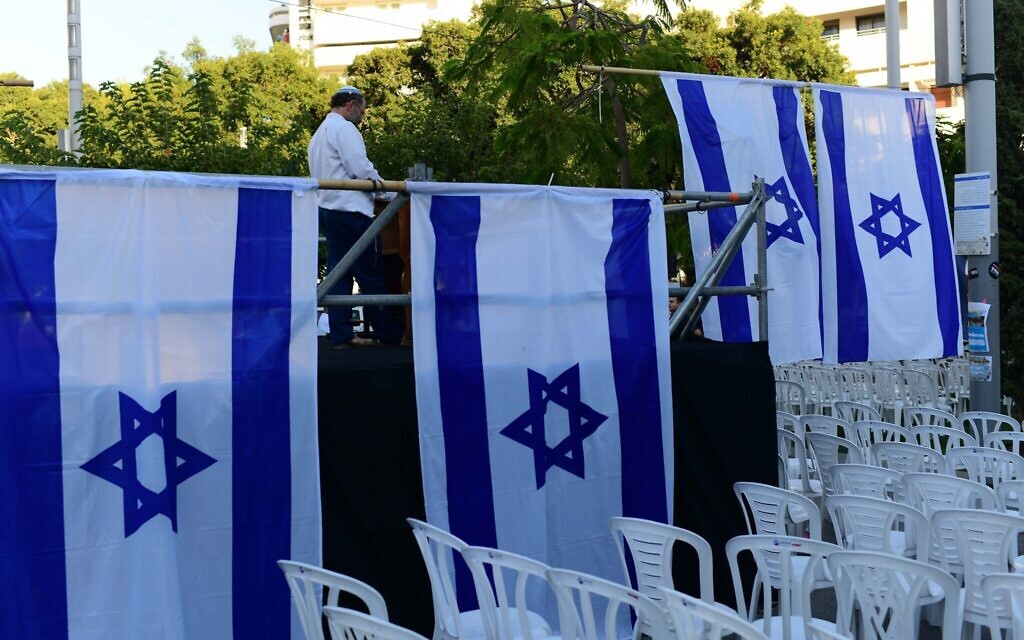
Activists from the Rosh Yehudi organization set up a “mechitzah” divider made of Israeli flags ahead of a public prayer event in Dizengoff Square, Tel Aviv, on Yom Kippur eve. September 24, 2023. (Tomer Neuberg/Flash 90)
During the prayer service opening Yom Kippur at the square on Sunday evening, secularist protesters tore down a bamboo frame that organizers had turned into a divider by hanging down Israeli flags from its top section. On Monday, as the sacred day drew to a close, secularists again disrupted a prayer service that did not feature a physical divider, which the municipality had banned this year, after allowing it in past years. The Supreme Court upheld the municipality’s right to ban a divider, but Rosh Yehudi, the non-profit that organizes the mass prayers, maintained that the frame did not violate the city’s orders.
This was also the first time that Rosh Yehudi’s prayer event, which has attracted some 2,000 worshipers each year, faced protesters.
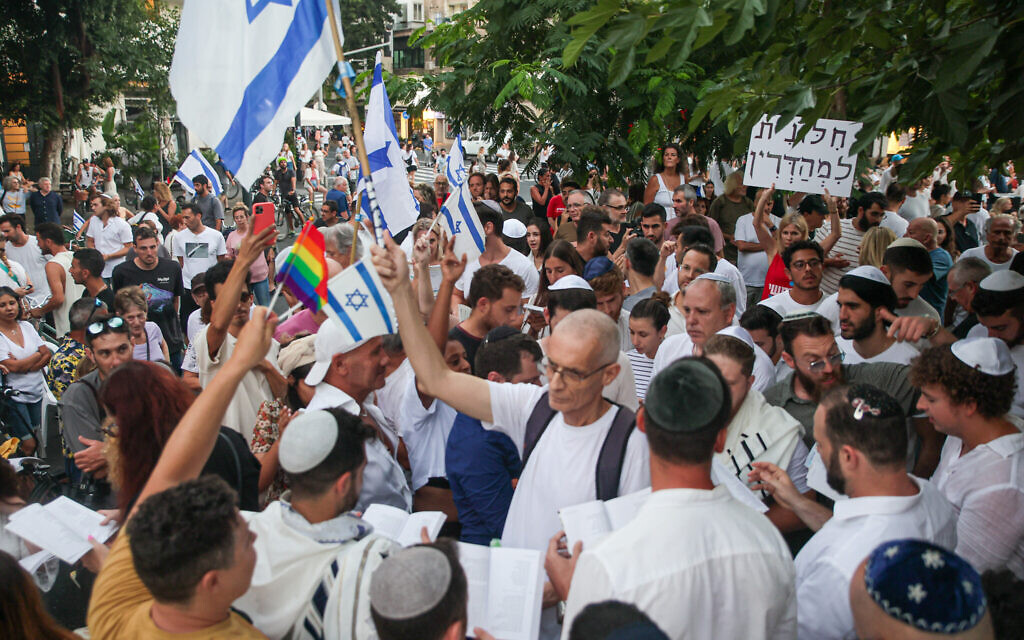
Activists protest against gender segregation in the public space during a public prayer event in Dizengoff Square in Tel Aviv, on Yom Kippur, the Day of Atonement, September 25, 2023. (Itai Ron/ Flash90)
Both Micha Gafni, the commander of police in central Tel Aviv, and a police spokesperson deemed the frame acceptable because it was traversable. Tel Aviv Mayor Ron Huldai said it was a violation.
The Talmudic debate over what is and isn’t a divider quickly became moot as the hundreds of secularists who had waited on the square ahead of the Kol Nidrei prayer of Yom Kippur tore the frame down and booed the worshipers out of the square.
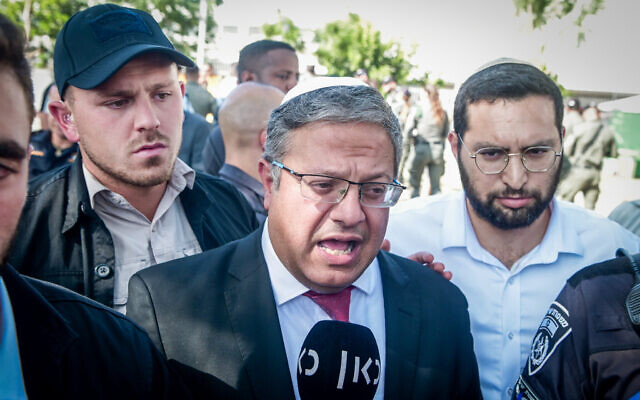
File: National Security Itamar Ben Gvir visits south Tel Aviv, September 3, 2023. (Avshalom Sassoni/Flash90)
‘A terribly sad sight’
Once the holiday ended, politicians got in on the donnybrook, which they saw dovetailing with existing political divides.
Prime Minister Benjamin Netanyahu condemned the “left-wing extremists who rioted against Jews as they prayed,” while Opposition Leader Yair Lapid initially blamed the worshipers for the Yom Kippur kerfuffle.
Lapid later appeared to distance himself from the protesters, saying “The sights we saw on Dizengoff Square must not repeat themselves,” while others called for a reckoning on both sides.
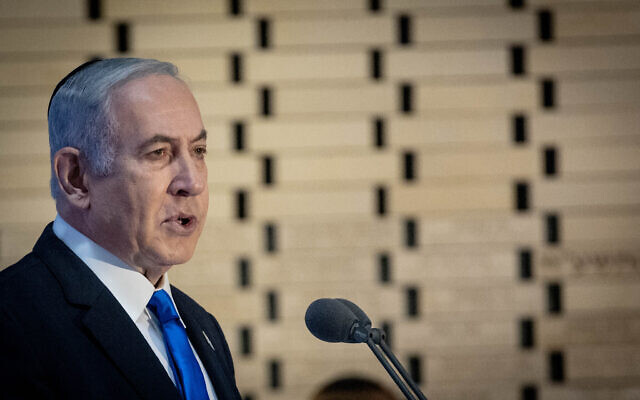
Prime Minister Benjamin Netanyahu attends the state ceremony marking 50 years since the Yom Kippur War at Jerusalem’s Mount Herzl, on September 26, 2023 (Chaim Goldberg/FLASH90)
“I understand the protesters’ pain but that’s no excuse for busting up a Yom Kippur prayer. It made me so sad,” Raz, the 24-year-old inventor of a first aid kit for car crash victims, wrote on Facebook.
Raz, a secular woman from a religious home who came to pray on Dizengoff Square on Yom Kippur called what happened “a terribly sad sight, people shouting, weeping, hurting on both sides.
“I saw middle-aged women who came out to shout ‘shame’ because they thought their public space had been compromised and they were fighting an important battle. I saw women my age sitting and weeping silently because to them, this was a civil war,” she wrote.
‘Positive moment’
But many of the demonstrators see what happened at Dizengoff as “a watershed moment of secular awakening,” in the words of Shoham Smith, a Tel Aviv-based writer who attended the demonstration against the segregated prayer.
“It was the only positive moment in this otherwise sad affair,” she told The Times of Israel. “It was a good moment for Judaism, which may give it the force to adapt to reality because this oppression evidenced in the dividers, it works against people within those communities, and mostly against the women there.”
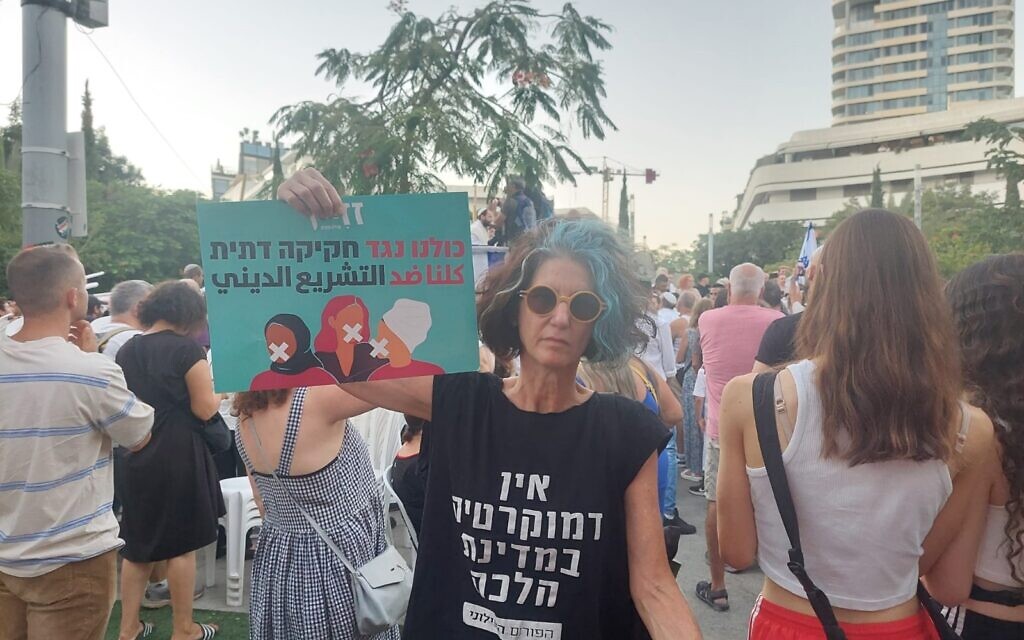
Shoham Smith protests against sex-segregated prayer on Yom Kippur in Tel Aviv, on September 25, 2023. Her t-shirt reads: “There is no democracy in a halachic state.” The sign reads: “We are all against religious legislation” in Hebrew and Arabic. (Courtesy)
Sex segregation in worship is to its critics emblematic of a worldview that subjugates women to a patriarchal power structure, though many religious women dispute being oppressed by the existence of a divider, known as a mechitzah in Hebrew.
“That liberal view is paternalistic and oppressive to women. Sex-segregated prayer is not,” Moriya Litvak, the director of Yehudit, a conservative women’s rights organization, told The Times of Israel.
Sami Peretz, a prominent journalist, also spoke of a fateful secular awakening at Dizengoff Square, which he attributed to a sense of oppression under Netanyahu’s right-wing government.
“The liberal camp feels humiliated under this government, so it rose up and fought back,” Peretz wrote in an op-ed in Haaretz Wednesday. Humiliation, he added, “is re-creating the liberal camp. It’s only just beginning.”
Many secular Israelis share Peretz and Smith’s view of the Dizengoff kerfuffle as an unusually fierce but justified pushback against the conservative policies and legislation of the government. To its critics, Netanyahu’s government appears to be prioritizing religious interests as it advances a controversial judicial overhaul that may deplete the legal arsenal of those seeking to ensure some civil liberties, including protection from religious coercion.
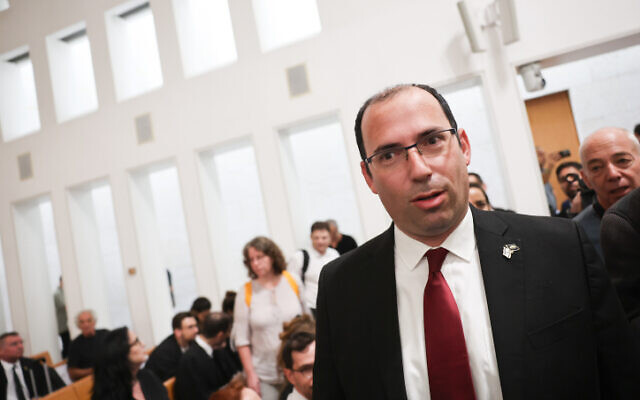
MK Simcha Rothman arrives at a hearing on petitions against the government’s ‘reasonableness law,’ at the Supreme Court in Jerusalem, September 12, 2023. (Yonatan Sindel/FLASH90)
To Smith, Rosh Yehudi epitomizes a vision for a theocratic Israel that she fears. “People rose up against the Yom Kippur prayer because to them, rising up is an extension of the Kaplan protest,” she said, referencing the stormy demonstrations against Netanyahu’s government and its push for a judicial overhaul.
The overhaul seeks to weaken the judiciary by transferring some of its powers, along with some held by bureaucrats, to the legislative branch and elected officials. Opponents of the overhaul say it removes checks and balances on the government that keep Israel a democracy. Supporters say it enhances democratic principles by returning power taken over by the courts to politicians who are more accountable to the public.
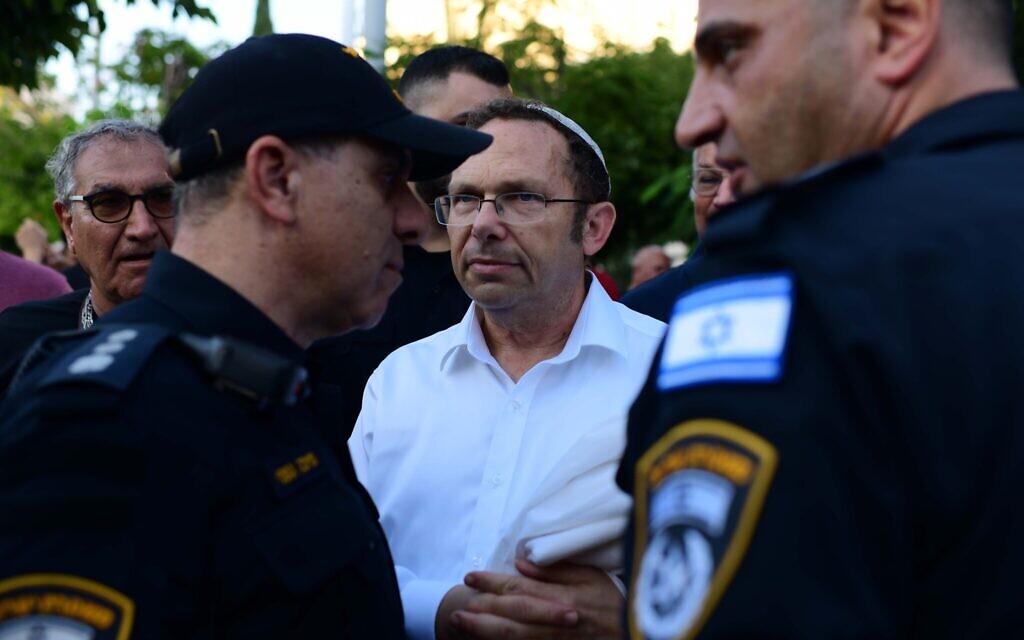
Israel Zeira, head of Rosh Yehudi, an Orthodox group, speaks with police officers as the group sets up a gender divider, amid protests, for a Yom Kippur public prayer event in Dizengoff Square, September 24, 2023 (Tomer Neuberg/Flash 90)
The parties on Dizengoff Square during the Yom Kippur prayers “overlapped for the most part” with the broader conflict over the judicial overhaul, Smith said. “There were exceptions, secular liberals who liked the idea of praying on Dizengoff Square, but broadly speaking, I think it ran along the lines of one’s ideological camp,” she said.
Israel Zeira, the founder of Rosh Yehudi, concurs partly. “It’s the same people. The protesters we saw there were the Kaplan protest bunch,” he said. But the worshipers were diverse, he said, adding: “I wouldn’t presume to know how they vote.”
Rosh Yehudi: religionification or coercion?
Following the confrontations, the Israeli media focused considerable attention on Rosh Yehudi, which had been relatively unknown to the general public prior to this summer.
Established in 2002 by Zeira, a religious-Zionist real-estate businessman, Rosh Yehudi’s mission statement is to encourage greater adherence to Orthodox Judaism by Jewish Israelis, said Zeira.
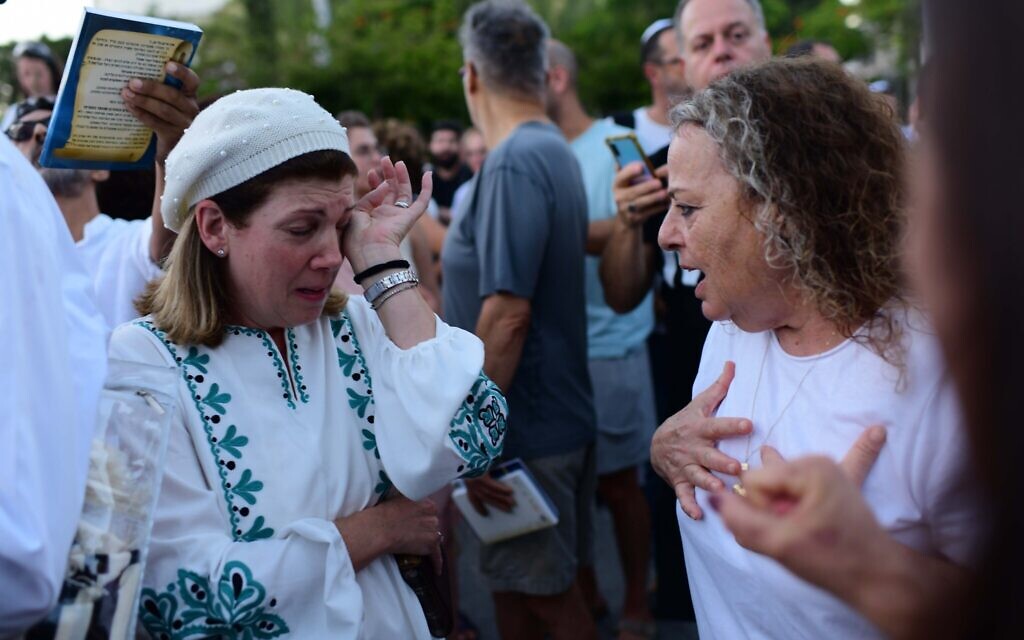
Secular and Orthodox Israelis at a contested public prayer service in Dizengoff Square, Tel Aviv, on Yom Kippur, September 24, 2023. (Tomer Neuberg/Flash90)
He confesses proudly to being an agent of hadatah – a Hebrew-language word that roughly means “religionification” – but says he opposes religious coercion. “I want all secular Jews to become religious. It’s why I set up Rosh Yehudi. There’s no secret agenda. We’re very open about it. But you can’t force people to believe. I don’t mean only that it’s not nice to do it: I mean you literally cannot do it. And I wouldn’t want to try,” Zeira told The Times of Israel.
I am envisaging a future, not in 25 years but tomorrow, in which the Messiah arrives and the following day the Great Temple begins getting rebuilt and all of the People of Israel become religious. Is that Messianism? The answer is yes. But does this threaten seculars in Israel? The answer is no — Rosh Yehudi’s Israel Zeira
Zeira has no issue with being accused of being a messianic seeking a religious state, both of which he says are true.
“I am envisaging a future, not in 25 years but tomorrow, in which the Messiah arrives and the following day the Great Temple begins getting rebuilt and all of the People of Israel become religious. Is that Messianism? The answer is yes. I’m a Messianic person. But does this threaten seculars in Israel? The answer is no,” Zeira told The Times of Israel.
Smith, the secular writer, described a radically different vision for Israel. “It can’t be a Jewish state. It will be a country of all its citizens. Israel-Palestine. A multicultural entity where all faiths can equally exercise their religions without infringing on one another’s rights” said Smith, who has three children.
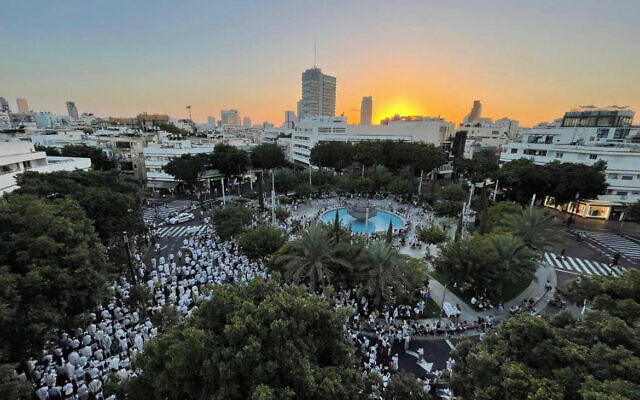
About 2,000 worshipers attended the Yom Kippur Neilah prayer at Dizengoff Square in Tel Aviv, Israel on October 5, 2022. (Courtesy of the Municipality of Tel Aviv)
Rosh Yehudi holds events for a general audience – mainly secular Jews – on Jewish holidays, as well as lectures and youth activities. It has a synagogue, Gvurat Israel, near Dizengoff Square, which lists the “pride community” as one of its target demographics and a lecture series on religion for young women as well as a project for assisting Jewish immigrants to get acclimated.
Asked about gay rights, Zeira said that being gay neither conforms to Halacha, Jewish Orthodox law, nor precludes seeking a deeper connection to Judaism. “We have multiple gay members in the community of Rosh Yehudi supporters,” he said.
Earlier this month, protesters rallied outside a synagogue where Rosh Yehudi hosted a talk on postmodernism by Yigal Levinstein, a prominent rabbi who has called homosexuals “deviants.” Rosh Yehudi neither endorses nor condemns this view, Zeira said.

Rabbi Yigal Levinstein delivers a lesson while activists protest against him at a Rosh Yehudi synagogue in Tel Aviv, on September 19, 2023. (Avshalom Sassoni/Flash90)
The organization is often portrayed as one of several groups seeking to establish religious Zionist enclaves within secular bastions or in some cases Arab communities. The ideological-driven efforts skew heavily right-wing and critics accuse Rosh Yehudi and like groups of attempting to import a West Bank settlement mindset into liberal communities.
“It’s all connected. Also the occupation. The people leading this segregated prayer have selected an iconic bastion of secularism, Tel Aviv, to run there a pilot program for religious coercion and segregation. For apartheid,” said Smith. “We’re seeing the same mechanism that treats people according to their categories, examined through a prism of Jewish supremacy. That’s what we pushed back against. Not some innocent prayer rally as some disingenuously claim.”
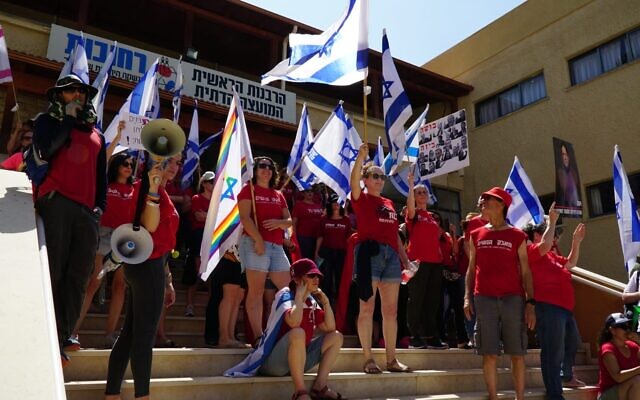
Women protest outside the rabbinate in Rehovot, July 1, 2023 (Nevet Kahana)
According to Zeira, Rosh Yehudi has helped several families that wanted to build religious communities move to Tel Aviv. The money comes from donations and government grants, but the families who build communities for Rosh Yehudi need to have additional sources of income, Zeira said.
“They do some work for the organization and we pay for that work, maybe help find them additional employment. But we have limited means,” he said.
His organization, which has an annual budget of about NIS 2.5 million ($650,000), has about 10 employees. According to Guidestar, the justice ministry’s registry for businesses and nonprofits, Rosh Yehudi’s highest-earning employee earns about NIS 100,000 ($26,000) annually. It has received government funding ranging from NIS 67,000 ($17,000) to NIS 150,000 ($39,000) in recent years in subsidies, especially for charity and immigrant absorption projects, Zeira said.
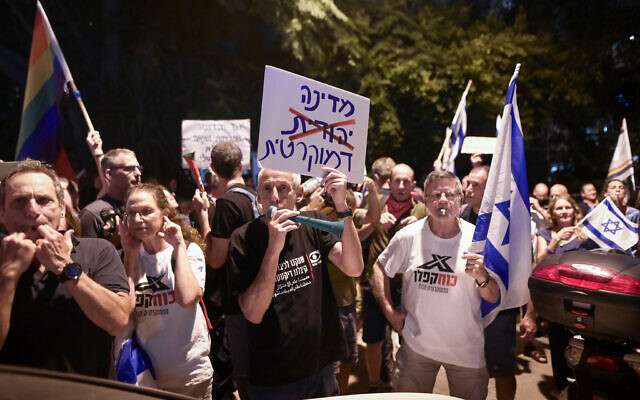
Israelis protest against Rabbi Yigal Levinstein in Tel Aviv on September 19, 2023. (Avshalom Sassoni/Flash90)
“Most of the funding comes from donations, small ones, by people whose lives were touched by our activities,” Zeira said.
This month was the first time that Rosh Yehudi encountered serious opposition, Zeira said, first in the protest outside the synagogue that hosted Levinstein and then during the Yom Kippur prayer.

Protesters against the government’s judicial overhaul, dressed as handmaids, at Tel Aviv’s Dizengoff Square on February 25, 2023 (Zohar Tal)
“It was a total shock,” said Zeira of the Yom Kippur prayer. “All the red lines have been crossed. We did not foresee it. We never thought Jewish people in Tel Aviv would disrupt a prayer on Yom Kippur,” he said.
The need for dialogue
On Thursday, the Tel Aviv municipality revoked permits it had given the group for a public sukkah over the Sukkot holiday and a traditional post-Simchat Torah celebration; Rosh Yehudi is now debating the future of Yom Kippur prayers in Tel Aviv, Zeira said.
This kind of reassessment is potentially a positive development, according to Rabbi Yuval Cherlow, a longtime advocate of religious-secular dialogue who heads a yeshiva in Tel Aviv.
Sometimes it’s wiser to sidestep a controversy than dive head-first into it — Rabbi Yuval Cherlow
“Maybe something positive will grow out of the resistance we saw,” Cherlow told The Times of Israel. He added that he condemns the actions of the protesters who disrupted the Yom Kippur prayer, which Cherlow supports in principle. Cherlow supports allowing Orthodox prayer in public. But, he added, “sometimes it’s wiser to sidestep a controversy than dive head-first into it.”
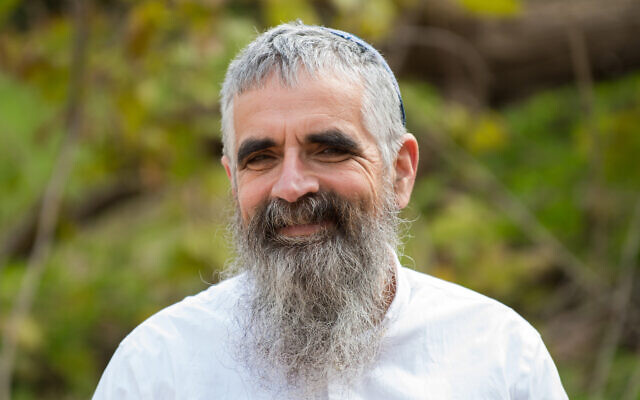
Rabbi Yuval Cherlow (Aryeh Katz)
“The circumstances are regretful, but it’s clear that there will need to be dialogue to restore the Yom Kippur prayer, which is dear to many people,” said Cherlow, one of the founders of the Tzohar group of moderate Orthodox rabbis. “This dialogue is exactly what needs to happen on the local level. It would be a step in the right direction.”


